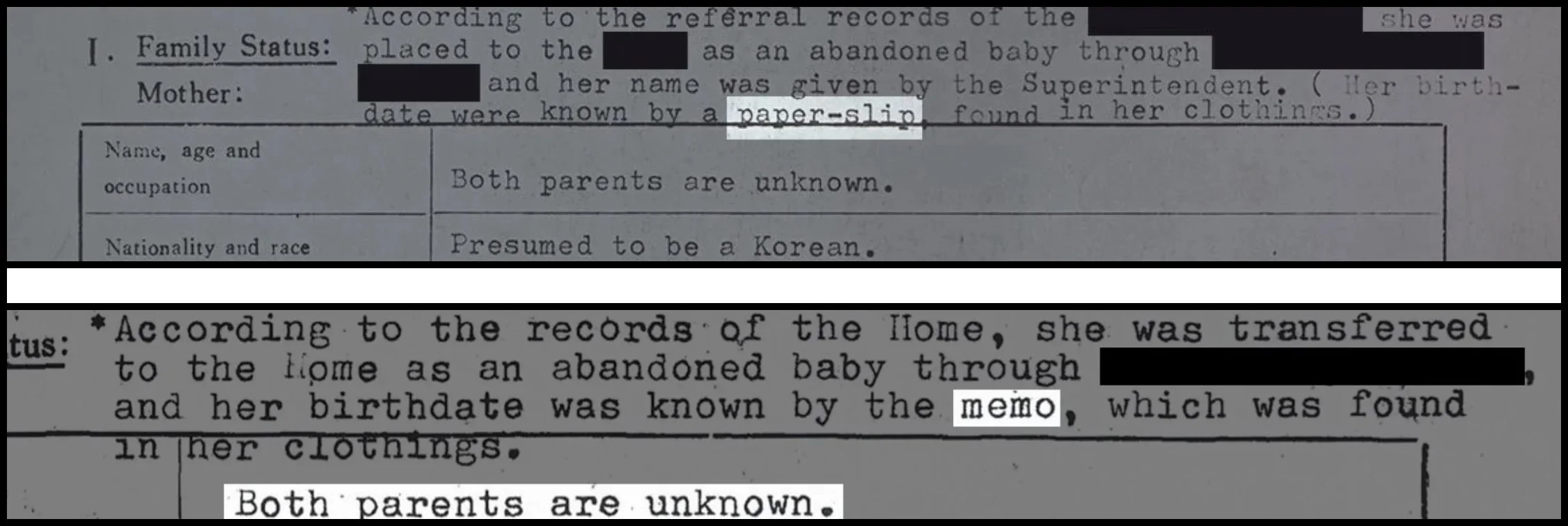Why The Name “Paperslip”?
Did KSS (Korea Social Service) flip a coin to decide which term of Orphanization they were going to use that day for a child’s “English Adoptive Child Study Summary” — “paper-slip” or “memo”? These terms appear in countless KSS Adoptees’ English Adoptive Child Study Summary documents, which were provided to Western adoptive parents at the beginning stage of the adoption process. Countless KSS Adoptees have grown up believing this often false “abandonment” story and have internalized this sense of “abandonment”. However, many of these exact same KSS Adoptees have later come to find that their formerly secret “Korean Adoptive Child Study Summary” documents (which we at Paperslip only figured out how to request and obtain from KSS in 2021) often contain more information about their history — sometimes, though not always including information about their birth parents.
No matter which term KSS used, the effect was the same — to gaslight KSS Adoptees for decades into believing that they were “abandoned”, effectively preventing Adoptees from searching for their birth parents, often until it is too late. However, most KSS Adoptees were instead “relinquished” by birth family members — often under great societal pressure — and many of us, especially in the adoption heyday of the 1970s and 1980s were outright “acquired” by unscrupulous doctors at maternity clinics and hospitals, where unsuspecting birth parents were frequently tricked into relinquishing their newborn children, who were then effectively sold to Korean Adoption Agencies. The same possibility of Orphanization (erasure of a child’s past to expedite the process of overseas adoption) was true for MANY Korean Adoptees — but the terms “paper-slip” and “memo” were terms unique to KSS.
The name “Paperslip” is emblematic of the wide scale “Orphanization” of KSS (Korea Social Service) Adoptees specifically, and of thousands of Korean Adoptees generally. Thousands of KSS Adoptees grew up believing that they were “abandoned” and “found with a paper-slip” or “memo” in their “clothings” (sic) — or that they were “found” or “abandoned” at a “police station” — since this is what was written in countless thousands “English Adoptive Child Study Summary” documents for KSS Adoptees. The terms “paper-slip” and “memo” were used specifically by KSS. However, similar orphanization language and often false “abandonment” stories were used by ALL of the major Korean Adoption Agencies.
However, secretly KSS kept a “Korean Adoptive Child Study Summary”, which often (though not always) contains more truthful information about the origins of a supposedly “abandoned” child — such as the names and birthdates of that child’s Korean birth parents. While the English and Korean Adoptive Child Study Summary documents are specific to KSS, ALL of the major Korean Adoption Agencies kept in their possession more information about a child’s origins than they were willing to share with Adoptees or their adoptive parents. While Adoptees are commonly too afraid to “open Pandora’s box” out of fear of rejection, Korean birth parents often also feel the same way — out of guilt and shame. It can take a lot of work from both Adoptees and birth parents to find and reconnect with one another, and the Korean Adoption Agencies and the Korean Government have long sought successfully to put as many hurdles in the way of that process as possible.
*It is important to note that NOT ALL Adoptees have FALSE information about their origins in their adoption files. We always tell Adoptees that we must ASSUME that any birth parent information contained in one’s adoption paperwork is TRUE UNTIL PROVEN FALSE. Otherwise, the Adoptee has NOTHING to go on for a birth family search (apart from DNA testing and on-the-ground gumshoe investigation in Korea). An Adoptee who believes that ALL Korean Adoptees’ paperwork is false is ALSO being gaslighted by their own fears and by the amount of stories currently in the media about the very real issues with the industry of Korean Adoption over 70 years of time. We personally know of many KSS and other Adoptees who have come to be in reunion based on their adoption paperwork which contained REAL and actionable information about their origins.
Many Korean Adoptees grow up believing they were heartlessly “abandoned,” without realizing that their origin stories are often far more complex. These stories frequently involve difficult and heartbreaking circumstances of RELINQUISHMENT shaped by poverty, systemic inequality, and cultural pressures — such as the preference for male children, the stigma against unwed mothers, and the limited rights afforded to women. In Korea, in cases of divorce, custody often defaulted to the father, and upon remarriage, children from previous relationships were often relinquished for adoption. In countless cases, birth parents were even deceived or coerced into giving up their children. We believe relinquishment is a fundamentally different concept from abandonment. Many Korean Adoptees who have reunited with their birth families have come to realize that the simple narrative they were raised with — that their birth mother “gave them up out of love” — often masks a far more complex and nuanced reality.
Please note that not ALL Adoptees have secret birth parent information in the “shadow file” kept by their Korean Adoption Agency — however, MANY Korean Adoptees do, yet are unaware of it or are unable to obtain this information. Paperslip is a site dedicated to helping to de-gaslight both KSS Adoptees and ALL Korean Adoptees regarding Korean Adoption Agency (and NCRC) practices. Please note that AFTER July 19th, 2025, ALL Korean Adoption Agency files began to be transferred to the Korean Government Agency NCRC (National Center for the Rights of the Child). Please note that NCRC has told us TWICE that KSS Adoptees should be able to continue to receive a copy of their “Korean Adoptive Child Study Summary” following the transfer of ALL Korean Adoption Agency files (including those of KSS) to NCRC starting July 19th, 2025. Please read here about how to submit a “Petition for Adoption Information Disclosure” request to NCRC via the KAS website — starting September 16th, 2025.

